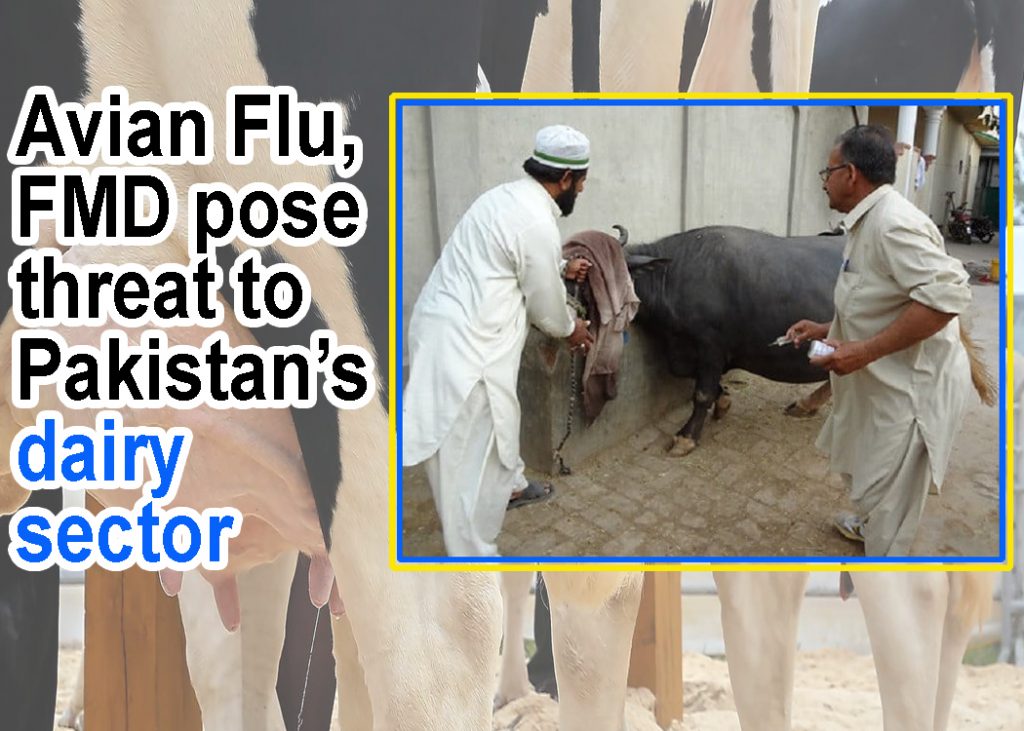
AVN News Desk
Pakistan’s dairy sector, a cornerstone of the country’s economy, is facing serious challenges due to recent outbreaks of avian flu and foot-and-mouth disease (FMD), threatening both the dairy farmers businesses and the nation’s food security.
While avian influenza, commonly known as bird flu, primarily affects poultry, its impact extends to dairy farming through environmental and economic channels.
In regions where poultry and dairy operations are closely linked, avian flu outbreaks can lead to heightened biosecurity measures, disrupting daily routines on farms. The culling of infected birds, a necessary response to the disease’s high contagion rate, results in a shortage of poultry manure—a key, cost-effective fertilizer for dairy farms.
Similarly, FDM, a highly contagious viral illness, targets cloven-hoofed animals, including cattle, which are vital to dairy farming. Infected animals suffer painful sores in their mouths and hooves, drastically reducing milk production and, in severe cases, leading to death.
The economic toll is substantial, with losses stemming from decreased milk yields, soaring veterinary costs, and the need for quarantine and culling measures to contain the virus.
The dairy farmers have to face considerable financial strain as declining milk production cuts into their already slim margins, while the costs of managing outbreaks—such as veterinary care and biosecurity measures—further burden their finances.
Besides, market volatility and reduces consumer confidence in dairy products and worsen their economic instability.
These outbreaks particularly pose a serious threat to the livelihoods of smallholder farmers, who rely on dairy farming not just for income but as a way of life,. The ripple effects extend beyond individual families, leading to economic decline in rural communities and increased hardship for those dependent on the dairy sector.
Dairy sector is also crucial for national food security as a significant drop in milk production can reduce the availability and affordability of dairy products, jeopardizing nutrition, especially for vulnerable populations.
The loss of dairy cattle due to FMD complicates efforts to rebuild herds, posing long-term challenges in maintaining a steady supply of dairy products.
In response to these challenges, the Pakistani government and agricultural institutions have intensified their support for affected farmers. This includes increased funding for veterinary services, subsidies for those impacted, and initiatives to strengthen disease surveillance and control.
The government is also emphasizing enhanced biosecurity protocols and improved disease management strategies.
To mitigate the impact of outbreaks, educating farmers on disease prevention and control is vital. In this connection, training programs focusing on biosecurity practices, early disease detection, and proper animal husbandry can play an important role.
Providing access to vaccines and effective treatments is also crucial in managing and preventing the spread of these diseases.
Non-governmental organizations (NGOs) and community groups are playing a key role in supporting affected farmers by offering financial aid, veterinary services, and technical assistance.
Collaborative efforts between these organizations and the government are essential in addressing the immediate needs of farmers and building long-term resilience in the sector.
Tackling the challenges posed by avian flu and FDM requires a multifaceted approach. Strengthening veterinary infrastructure, improving disease surveillance, and fostering greater collaboration among stakeholders are critical steps to mitigate the impact of these outbreaks.
Ensuring the future resilience of Pakistan’s dairy sector depends on coordinated and sustained efforts across all levels of society.





